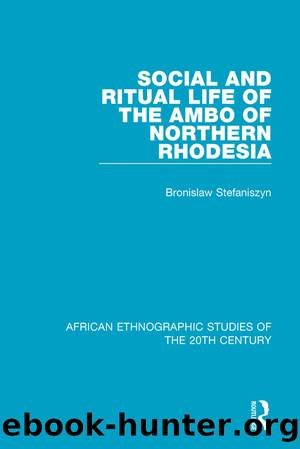Social and Ritual Life of the Ambo of Northern Rhodesia by Bronislaw Stefaniszyn Raymond Apthorpe

Author:Bronislaw Stefaniszyn, Raymond Apthorpe [Bronislaw Stefaniszyn, Raymond Apthorpe]
Language: eng
Format: epub
Google: egENMwEACAAJ
Publisher: London
Published: 1964-01-15T04:46:23+00:00
The meaning of the naming rites
Many writers including Melland (1923: 150, 53), Doke (1931: 241), Smith (1920; II: 152), Munday (1948: 1) and Colson (1951: 148) speak of naming and reincarnation among the Central African peoples they have investigated. Having spent many years among the Ambo, I am of the opinion that it is not simple reincarnation that is involved.1 I once found a diviner of repute who defended reincarnation pure and simple. âLookâ, he said, âthe dead people come back to this world again, one after another, and this is how the villages are filled again with new people.â When wanting a photograph of a shade calabash shrine (of a âreincarnatedâ guardian shade) I was unable to find one. But at last a headman volunteered to show me one. He did so, and ridiculed the old diviner for holding an idea of reincarnation pure and simple. An interview of a woman with a diviner in a somewhat abbreviated form has been given above. The diviner asks whether all ancestors of the motherâs and fatherâs clans have been honoured by having children named after them.
In the prayer offered while a mother has painful labour, a shade is invited to have its name given and thus to be reborn. In many prayers, âto be named in the childâ and âto be rebornâ are equivalent phrases. A shade ought to be remembered and thus honoured. In the same way the spirit makes the child sick as an expression of a wish for a name or for beer. The crux of the matter is that there is on the one side a guardian, and on the other, a ward. The former acts upon the latter making him sick. Again, in the prayer of removing the name it is a simple apology which is offered and the trying of another name. There is no reincarnation involved. Such a change in a reincarnated person would be a metamorphosis into another personality or shade. I have also noted that individuals may live for years yet lacking a shade name. In the case of nameless children, the Ambo simply say that they have not yet received a shade.
Rebirth or reincarnation is, then, only a figure of speech. The ward of a shade is called cibwela, âthe come backâ. A name has been revived and inherited. As has been mentioned above, ancestors have only one desireânot to be forgotten. There are only two means of being remembered: in the names of children and in an occasional beer offering.
Once a child is dedicated to an ancestor by being given its name, it falls under the full protection of the shade and becomes identified with it.
The child can take its name from the fatherâs or the motherâs side. However, every Ambo at his death has only one shade to be remembered, from his motherâs clan.
Although, then, there is a plurality of entities, there is nevertheless a mystical identity of the guardian and the ward in the sharing of the common name and the community of interests, though the interests are not reciprocally identical.
Download
This site does not store any files on its server. We only index and link to content provided by other sites. Please contact the content providers to delete copyright contents if any and email us, we'll remove relevant links or contents immediately.
| Central Africa | East Africa |
| North Africa | Southern Africa |
| West Africa | Algeria |
| Egypt | Ethiopia |
| Kenya | Nigeria |
| South Africa | Sudan |
| Zimbabwe |
Goodbye Paradise(2974)
Men at Arms by Terry Pratchett(2408)
Tobruk by Peter Fitzsimons(2065)
Pirate Alley by Terry McKnight(1911)
Arabs by Eugene Rogan(1841)
Borders by unknow(1791)
Belonging by Unknown(1473)
The Biafra Story by Frederick Forsyth(1327)
It's Our Turn to Eat by Michela Wrong(1305)
Botswana--Culture Smart! by Michael Main(1239)
A Winter in Arabia by Freya Stark(1226)
Gandhi by Ramachandra Guha(1198)
Coffee: From Bean to Barista by Robert W. Thurston(1184)
Livingstone by Tim Jeal(1154)
The Falls by Unknown(1143)
The Source by James A. Michener(1137)
The Shield and The Sword by Ernle Bradford(1102)
Egyptian Mythology A Fascinating Guide to Understanding the Gods, Goddesses, Monsters, and Mortals (Greek Mythology - Norse Mythology - Egyptian Mythology) by Matt Clayton(1089)
Africa: Altered States, Ordinary Miracles by Richard Dowden(1080)
